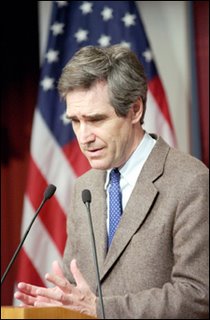About the only time it got exciting was when Morton pouted over being misquoted by one of the reporters asking questions. It was about how Morton had slagged Steady Eddie Stelmach saying if elected he would end up losing the next provincial election. Morton went ballistic and claimed he never said it, and wanted the reporters source or he would sue. Thin skined or what. And what was with Mortons makeup? It made him look like a California Beach Boy.
The winner? Steady Eddie Stelmach.He actually appeared sincere, unlike his opponents. Look at this picture, who is actually looking at you.
But I am biased I am a Ukrainian Albertan after all.
See:
Ted Morton
Conservative Leadership Race
Find blog posts, photos, events and more off-site about:
Ted Morton, Alberta, Dinning, Stelmach, politics, PC, Alberta PC Leadership Race, Premier

